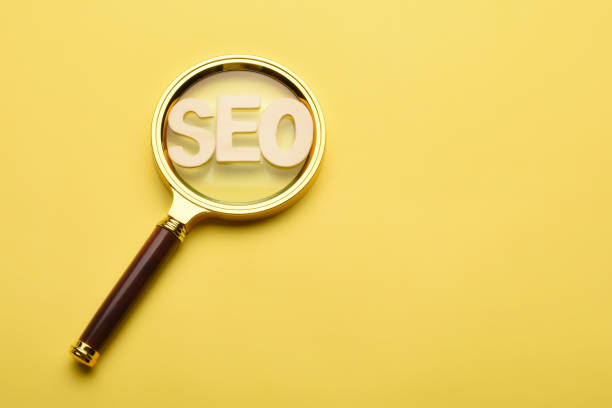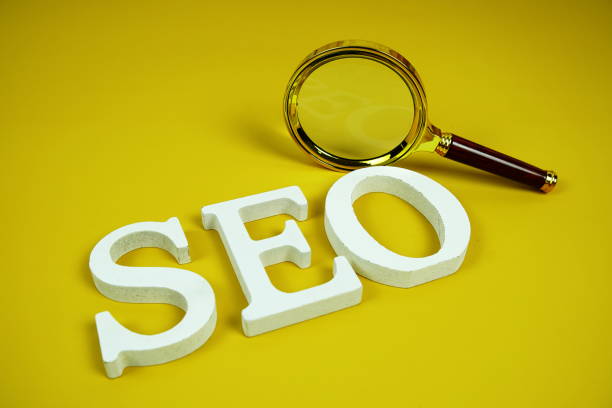What is SEO? An Introduction to Search Engine Optimization

In today’s highly competitive world, a strong online presence is vital for any business.
But simply having a website is not enough; you need to ensure that your target audience can find your website.
This is where the concept of #SEO or Search Engine Optimization comes in.
SEO is a set of techniques and strategies implemented with the aim of improving your website’s #ranking in the organic (non-paid) search engine results, such as Google. When a user searches for a phrase on Google, the search engine examines billions of pages and displays the most relevant and high-quality results.
The main goal of SEO is to get your website among these top results.
This process goes beyond merely using keywords; it involves improving various technical, content, and credibility aspects of the website.
With proper SEO, you can attract more #organic_traffic, which means visitors who are actively looking for your services or products.
This traffic, unlike paid advertising traffic, is sustainable and more cost-effective, with a higher conversion rate.
This is an explanatory look at the importance of SEO.
Did you know that customers’ first impression of your company is your website? With a powerful corporate website from Rasawb, multiply your business’s credibility!
✅ Custom and eye-catching design tailored to your brand
✅ Improved user experience and increased customer attraction
⚡ Get free consultation!
Keyword Research, the Cornerstone of Every SEO Strategy

The foundation of any successful SEO strategy is deep and comprehensive keyword research.
Without a proper understanding of what terms your target audience is searching for, you cannot produce content that meets their needs and appears in search results. Keyword research is the process of discovering the terms that users enter into search engines to find your information, products, or services.
This process involves identifying both short-tail keywords (like “SEO”) and long-tail keywords (like “SEO tutorial for beginners”).
Longer keywords often have less competition and a clearer user intent, making them highly valuable for attracting targeted traffic.
The goal of this research is not only to find keywords with high search volume but also to find keywords that align with the user’s true intent.
Is the user looking to buy? Or looking for information? Or simply researching? Understanding this intent (Search Intent) is crucial.
This section includes an expert and guidance step-by-step look at identifying and prioritizing appropriate keywords so that your SEO strategy is built on strong data.
On-Page SEO and Content Optimization

On-Page SEO refers to all actions you take within your website to improve its ranking in search engines.
This includes optimizing various elements such as Title Tag, Meta Description, proper use of headings (H1, H2, H3), image optimization (using appropriate Alt Text), friendly URL structure, and internal linking.
The title tag is the first thing users see on the search results page and must be both engaging and include the page’s main keyword. Meta descriptions are short summaries of page content that entice users to click.
High-quality and keyword-relevant content, well-structured and highly readable, is the core of On-Page SEO.
Also, ensuring your website has logical internal linking helps search engines understand your site’s structure and easily crawl and index different pages.
Page load speed optimization is also an important factor in On-Page SEO, as it affects both user experience and is a direct ranking factor.
This section is an educational guide for implementing On-Page SEO best practices.
In the following, some of the most important On-Page SEO elements and their impact are mentioned:
| Element | Description and Importance |
|---|---|
| Title Tag | The most important On-Page element; should include the main keyword and be less than 60 characters. |
| Meta Description | A short description of the page for search results; affects Click-Through Rate (CTR). |
| URL Structure | Short, readable, and includes keywords; helps search engines and users. |
| Headings (H1-H6) | Organizes content, increases readability; H1 for the main title and H2-H6 for subtitles. |
| Internal Linking | Connecting related pages within a website; improves user experience and distributes SEO value. |
| Image Optimization | Using descriptive Alt Text and reducing image size for load speed. |
Off-Page SEO and the Importance of Backlinks

Unlike On-Page SEO, which focuses on optimizing elements within your website, Off-Page SEO refers to all activities performed outside your website that help improve its ranking.
The most important and influential factor in Off-Page SEO is backlinks.
A backlink, or inbound link, is a link from one website to your website, considered a “vote of confidence” from that website to your content. Search engines consider backlinks a sign of a page’s credibility and importance.
The more numerous and higher quality the inbound backlinks to your site, the more credible and trustworthy search engines will view your website.
But the important point is the quality of these links; a backlink from a reputable and relevant website is far more valuable than dozens of backlinks from low-authority and irrelevant sites.
In addition to backlinks, other factors such as social media signals (shares and likes), brand mentions (without links), and local SEO also play a role in Off-Page SEO.
Creating valuable and shareable content, participating in online communities, and digital public relations are among the natural ways to acquire high-quality backlinks.
This section provides an explanatory look at off-site factors that influence your domain authority.
Are you tired of your company’s website not being seen as it deserves, losing potential customers? With professional and effective website design by Rasawb, solve this problem forever!
✅ Increase brand credibility and gain customer trust
✅ Attract targeted sales leads
⚡ Contact us now for a free consultation!
Technical SEO; A Strong Infrastructure for Higher Rankings

Technical SEO refers to optimizing your website’s technical infrastructure so that search engines can easily crawl and index it.
If search engines cannot access your pages and understand their content, no matter how high-quality your content is, it will never appear in search results.
Key topics in Technical SEO include site load speed, mobile compatibility, HTTPS protocol usage, correct robots.txt file and XML sitemap structure, fixing crawl errors, and optimizing data structure (Schema Markup). Page load speed not only affects SEO ranking but is also crucial for user experience; users often abandon slow sites.
Mobile compatibility is also of paramount importance, as a large portion of searches are conducted via mobile devices, and Google prioritizes mobile-friendly websites.
Ensuring your website uses an SSL certificate for HTTPS protocol increases security and is considered a positive ranking factor.
Technical SEO is an analytical and essential part to ensure the foundational health of a website for any SEO strategy.
Producing Valuable and Engaging Content for SEO

Content is king in SEO.
No SEO strategy can succeed without high-quality, relevant, and engaging content.
Content creation in SEO doesn’t just mean stuffing pages with keywords; it means creating real value for the audience.
Your content should answer users’ questions, solve their problems, and satisfy their informational needs. This can include blog articles, videos, infographics, case studies, guides, and many other formats.
For your content to be effective in SEO, it must both align with target keywords and be comprehensive and in-depth.
New Google algorithms look for content that covers the overall concept of a topic, not just specific keywords.
Also, the concept of E-A-T (Expertise, Authoritativeness, Trustworthiness) has become very important in content creation.
Content written by experts, that is authoritative, and that users can trust, gets a better ranking in search results.
Question-provoking or entertaining content can increase user engagement, which is itself a positive signal for SEO.
Tools and Metrics for Measuring SEO Success

To know how effective your SEO strategy is, you need continuous measurement and analysis.
Fortunately, powerful tools exist for this purpose that provide valuable data.
Among the most important of these tools are Google Analytics and Google Search Console, both of which are free and essential. Google Analytics provides information on website traffic, user behavior, traffic sources, and conversion rates.
Google Search Console also helps you monitor your website’s performance in search results, identify and fix crawl errors, and see the keywords users have used to find you.
In addition to these free tools, there are also paid and more advanced tools like Ahrefs, SEMrush, and Moz, which offer more capabilities for keyword research, competitor analysis, backlink checking, and rank monitoring.
Key Performance Indicators (KPIs) in SEO include organic traffic, keyword rankings, Click-Through Rate (CTR), Bounce Rate, and user session duration.
Continuously reviewing these metrics helps you identify the strengths and weaknesses of your SEO strategy and take necessary actions for improvement.
This section includes news-like analysis and reporting of your SEO performance.
In the following, we compare some of the popular SEO tools:
| Tool Name | Type (Free/Paid) | Main Features |
|---|---|---|
| Google Analytics | Free | Website traffic analysis, user behavior, traffic sources, conversion rate. |
| Google Search Console | Free | Search performance, crawl errors, indexing, searched keywords. |
| Ahrefs | Paid | Keyword research, competitor backlink analysis, rank tracking, content analysis. |
| SEMrush | Paid | Keyword research, competitor analysis (paid and organic), technical SEO, content marketing. |
| Moz Pro | Paid | Keyword research, rank tracking, link analysis, site audit. |
Common SEO Mistakes and How to Avoid Them

On the path to optimizing your website for search engines, mistakes can occur that not only don’t help your SEO but can also harm it and lead to Google penalties.
One of the most common mistakes is Keyword Stuffing, which means the excessive and unnatural repetition of a keyword in content. This action not only degrades the user experience but is also recognized as spam by search engines.
Duplicate content or low-quality and “thin” content are also common mistakes.
Search engines value original and valuable content, so copying content from other sites or producing weak content leads to low rankings.
Ignoring site speed and mobile compatibility can also be disastrous, as these factors significantly impact user experience and rankings.
Building spammy backlinks or buying backlinks from low-quality sites are also considered black-hat SEO techniques with irreversible consequences.
Ignoring broken links and 404 errors also harms site credibility.
A correct guidance emphasizes avoiding these errors to remain safe from search engine penalties.
Are you disappointed with the low conversion rate of your online store?
Rasawb, with professional e-commerce website design, is your definitive solution!
✅ Increase your sales and revenue
✅ Unparalleled user experience for your customers
⚡ Get a free consultation now!
The Future of SEO; Trends and Challenges Ahead

The world of SEO is constantly changing and evolving.
With technological advancements and changes in user behavior, SEO specialists must constantly keep themselves updated.
One of the most important future trends is the impact of Artificial Intelligence (AI) on search engine algorithms.
Google algorithms like RankBrain and BERT have improved natural language understanding, meaning search engines can better understand the intent behind user queries.
This increases the importance of producing comprehensive and high-quality content that fully answers user questions.
Voice Search SEO is also growing, as the number of users of voice assistants like Siri and Google Assistant is increasing.
Optimizing for voice search requires focusing on longer and more natural keywords.
Core Web Vitals have also become important ranking factors, emphasizing loading speed, interactivity, and visual stability.
Furthermore, the concept of E-A-T (Expertise, Authoritativeness, Trustworthiness) has gained increasing importance and become a critical ranking factor.
This section includes news and expert analysis of the future landscape of SEO.
Practical Steps to Improve Your Website’s SEO

After getting familiar with various aspects of SEO, it’s time to take practical steps to improve your website’s ranking.
The first step is to conduct a comprehensive SEO Audit to evaluate your site’s current status and identify its strengths and weaknesses. This audit should include an examination of On-Page, Off-Page, and Technical SEO.
After that, conduct in-depth keyword research and compile a list of targeted keywords that are both relevant to your business and have the potential to attract high traffic.
Then, optimize your content based on these keywords; both produce new content and improve existing content.
Ensure your website is technically sound: high load speed, full mobile compatibility, and HTTPS protocol.
Look for opportunities to acquire high-quality backlinks from reputable websites in your niche.
Finally, regularly monitor your results using tools like Google Analytics and Search Console and adjust your strategy based on data.
SEO is an ongoing process and requires patience and persistence, but its long-term results will be highly beneficial.
This section is an educational and practical guide for starting and continuously improving SEO.
Frequently Asked Questions
| Question | Answer |
|---|---|
| What is SEO? | SEO, or Search Engine Optimization, is the process of increasing the quality and quantity of website traffic by improving the site’s ranking in natural (organic) search engine results like Google. |
| What are the main types of SEO? | SEO is divided into three main categories: On-Page SEO, Off-Page SEO, and Technical SEO. |
| What does On-Page SEO include? | On-Page SEO involves optimizing elements within the website, such as keywords, page title (Title Tag), meta description (Meta Description), content, URL structure, images, and internal links. |
| What is Off-Page SEO? | Off-Page SEO refers to activities outside the website that help improve its ranking, such as backlink building, social media marketing, and brand mentions. |
| What is Technical SEO? | Technical SEO focuses on optimizing the technical aspects of a website to help search engines crawl and index it more effectively. This includes site speed, mobile-friendliness, site structure, sitemaps, and Robots.txt file. |
| What role do Keywords play in SEO? | Keywords are phrases that users enter into search engines. The correct and targeted use of relevant keywords in content and site elements helps search engines understand your page’s topic and display it for relevant searches. |
| What is a Backlink and why is it important? | A backlink, or inbound link, is a link from one website to another website. Backlinks act as a “vote of confidence” from other sites for search engines and play a significant role in a site’s credibility and ranking increase, especially if they come from reputable sites. |
| What impact does quality content have on SEO? | High-quality, relevant, comprehensive, and unique content not only attracts and retains users but also signals to search engines that your page is valuable. This helps improve ranking, reduce Bounce Rate, and increase user session duration on the site. |
| Why is site load speed important for SEO? | Site load speed is an important ranking factor for Google. Faster sites provide a better user experience, have lower bounce rates, and are preferred by search engines. |
| Is SEO a one-time process? | No, SEO is an ongoing and long-term process. Search engine algorithms are constantly changing, competition is increasing, and website content also needs updates. Therefore, SEO requires continuous monitoring, analysis, and optimization. |
And other services of Rasa Web Advertising Agency in the field of advertising
Smart Direct Marketing: Revolutionize click-through rates with Google Ads management.
Smart Brand Identity: A professional solution for digital branding focused on optimizing key pages.
Smart Marketing Automation: A professional solution to increase website traffic with a focus on customizing user experience.
Smart Website Development: A professional solution for online growth with a focus on SEO-driven content strategy.
Smart Brand Identity: An effective tool for customer behavior analysis with the help of intelligent data analysis.
And more than hundreds of other services in the field of internet advertising, advertising consultation, and organizational solutions
Internet Advertising | Advertising Strategy | Advertorial
Resources
Comprehensive SEO Guide
Key SEO Tips
What is SEO?
SEO Optimization
? To reach the peaks of success in the digital world, Rasawb Afarin Digital Marketing Agency, with expertise in user-friendly website design and comprehensive online marketing strategies, is your reliable partner.
📍 Tehran, Mirdamad Street, next to Bank Markazi, Southern Kazeroon Alley, Ramin Alley, No. 6




